Proof Of Concept
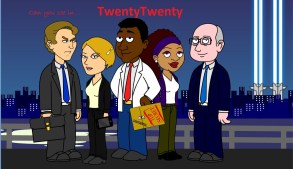
One of the big changes I’m most excited about this year is my classroom Alternate Reality Game. Briefly, my students are the main characters in a yearlong, real-world, classroom video game. Revisit this post if you need a refresher. I will catch you up on our story so far by sharing the recap “The Narrator” wrote for my students on their TwentyTwentySchoology discussion thread after completing Act I.
Our Story So Far:
The year started with strange codes appearing in your work. When cracked, these codes lead you to different sites around the internet where you found puzzles. As the year progressed, you learned these codes and puzzles were being sent back from the future and hidden in your work by someone named Sammy because Sammy needs your help. Sammy has to encode and hide everything because Malus Evermoore, who defeats Arthur Baxter to become President of the United States in 2020, turns Sammy’s America into a dystopian nightmare by 2036. Using a stolen Quantum computer, Sammy reached out to you and asked you to find a way to stop Malus Evermoore before it’s to late.
Back in 2014, Jenna Jones is looking for her brother Jamal Jones who hasn’t been seen since he went to work at Evermoore Energy. You see, before Malus Evermoore became President in 2020 he and Jamal started Evermoore Energy in 2013. Using Jamal’s discovery from his time at CERN, Evermoore and Jamal created a Dark Fusion reactor; a reactor that harnesses the power of Space’s Dark Energy. Evermore Energy began to power American homes for free with promises of powering the rest of the world not long after.
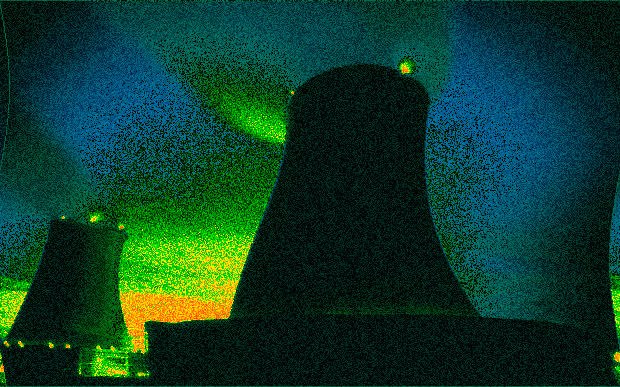
Unfortunately, it seems Dark Energy is part of the problem in 2036. Sammy talks about people being “bathed in the Blacklight,” which seems to be an allusion to the color of the Dark Energy being pulled from Space into the Dark Fusion Reactor, and fears she will be “bathed in the Blacklight” next as Sammy has failed some type of test. Sammy also told you that Evermoore Energy’s promise of powering the rest of the world is a lie.
Sammy decided to spend the last remaining energy cells of the Quantum computer to make a clear connection with you and ask you to be ready to solve the puzzle of the Qutrit. If Sammy could power the Quantum computer with a Qutrit, Sammy would be able to stay better hidden from Malus and interact with your time more easily. To get the Qutrit formula Sammy hacked into Jamal’s computer, but Jamal had encrypted the formula as an SSTV signal, an old method of transmitting pictures, that Sammy couldn’t decode. Again, your help was needed!
Sammy sent you the SSTV coded formula, and after a few weeks, you broke the SSTV encryption and the following image was sent to Sammy who had been monitoring Twitter (Sammy’s preferred method of communication).
Tools and ideas to transform education. Sign up below.
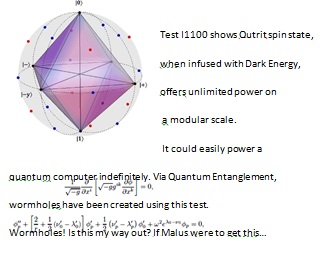
The delivery of the Qutrit formula to Sammy has brought Act I to a close, but many questions remain. How can Malus Evermoore be stopped before he destroys the world? Can Jamal be saved? Should he be? What are the wormholes Jamal wrote about in the Qutrit formula? How does Arthur Baxter fit into all of this? How will things change now that Sammy has the Qutrit formula? But, most importantly, will you, the students of 2014, be able to save Sammy and the rest of the world by the end of the school year?
I’ve never run an ARG before, or anything as complicated as this, really. I knew it was going to be hard, and I’m making tons of mistakes, but what I think I have is a proof of concept. The game works.
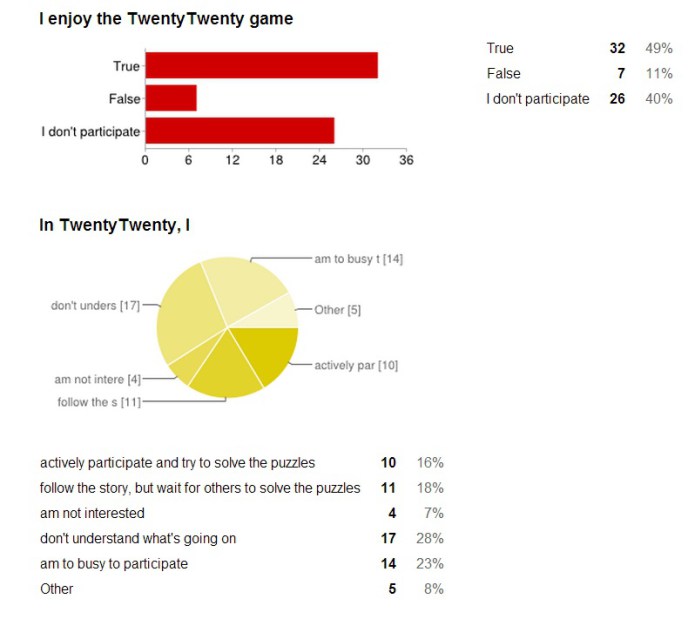
Half of my class enjoys TwentyTwenty, and it is normal in an ARG to have both people who actively participate and some who watch from the sideline (the few I’ve participated in, I watched from the sideline). I am really pleased with those numbers because I see lots of room for improvement in this game.
What I need to do is convert those that are too busy and those that don’t understand how to play into active participants. To do that, I’ve made some changes. I’ve created The Narrator who now posts weekly on their TwentyTwenty discussion thread and updates everyone on the story, gives insights into characters, progress made during the week, and active clues/puzzles. Here’s another example post by The Narrator:
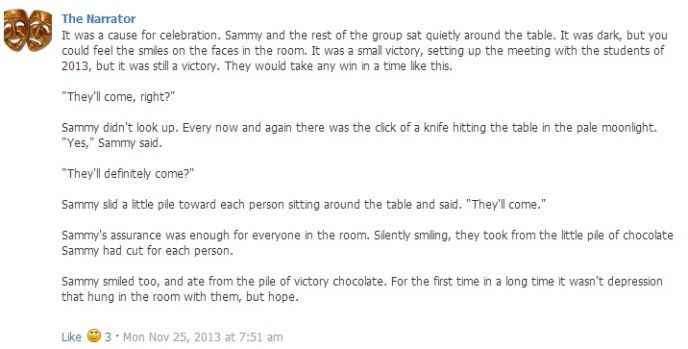
I also have to do a better job of being more organized. With teaching, coaching, and real life, I haven’t been doing a good job of creating a living environment for my students. The characters don’t interact with them enough. I’m going to put together a rotating schedule of character interactions because if I make a schedule out of these interactions, I know I’ll do a better job.
Another issue I am having is the speed and dominance with which a few students solve puzzles (man, they are so good at this game). I think this is a bad thing right now because it doesn’t give everyone a chance to try and solve the puzzles. I think I am going to start having the characters give a submission date for puzzles. For example, posting the answer on a Twitter account that will only be active for an hour a week after the puzzle is discovered.
Finally, to encourage participation instead of having a new discussion thread every week, I have opened an Act long discussion thread, so students will be able to follow the discussion without having to click through a bunch of old, archived threads. I’ve also reminded them that TwentyTwenty is a cooperative ARG. They gain nothing by withholding information and should do a better job of informing everyone of what they are trying to do and how they eventually solved a clue/puzzle. Communicate!
Again, I’ve identified many ways to make TwentyTwenty better, and I am going to keep making changes throughout the year. An ARG is a living, breathing thing.
What I am most excited about though, is the kids are one puzzle away from allowing me to take this to the next level. Once Sammy’s Quantum computer is able to open Wormholes into 2014, the interactions are going to become physical. Wormholes will allow Sammy to hide things around the school and town, use lockers as dead-drops, send the kids Geo-caching, and other fun stuff like that. Physical puzzle hiding will hopefully motivate more to play and get them out of the house and outside. And, after the game moves into the physical world, well… let’s just say that it won’t go unnoticed by our villain Malus Evermoore!
In a few days, I’m going to post a video and explanation of the SSTV puzzle, how I made it, and how my students solved it because it is awesome and it blew my kids’ minds. I want more people to see it because I bet you can find a use for SSTV in your class!
cross-posted on Teched Up Teacher
Chris Aviles teaches English at Barnegat High School in New Jersey. He presents on education topics including gamification, technology integration, BYOD, blended learning, and the flipped classroom. Read more at Teched Up Teacher.
Chris Aviles is a STEM teacher, edtech specialist, and president of Garden State Esports. He is also a regular contributor to Tech & Learning.
